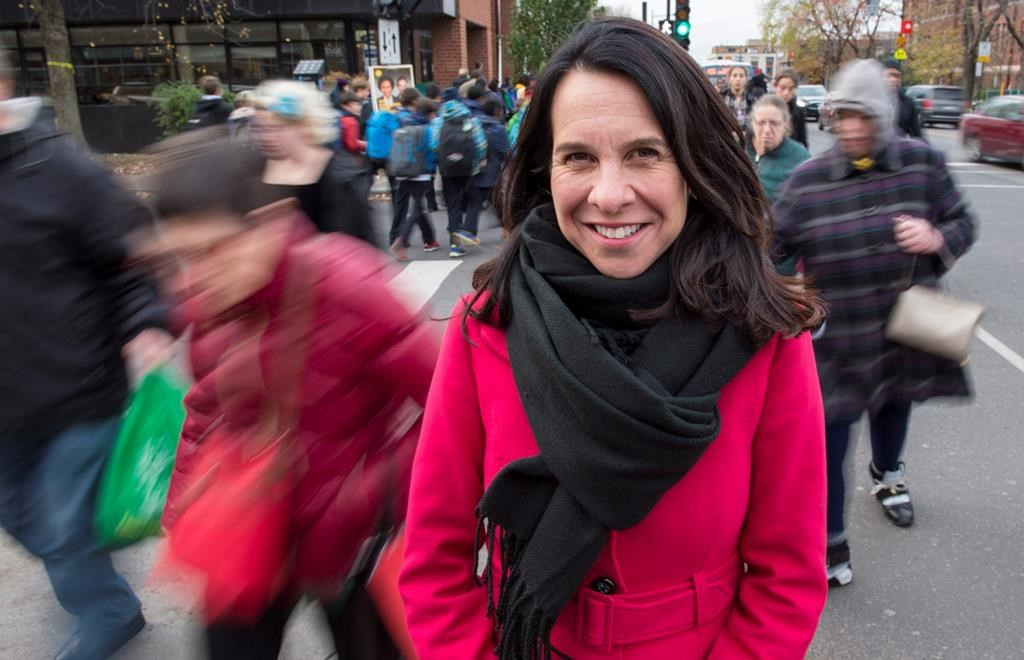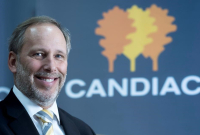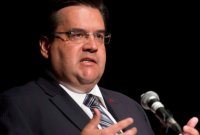Support strong Canadian climate journalism for 2025
While it is generally accepted that Montreal is experiencing a period of economic prosperity not seen in a generation, the city's mayor appears to be having a tough time ensuring he'll secure a second mandate.
Opinion polls suggest incumbent Denis Coderre, 54, and relative newcomer Valerie Plante, 43, are in a statistical tie ahead of Sunday's mayoral election in Canada's second-largest city.
Coderre, a former federal Liberal cabinet minister, boasts of 150 cranes in the sky representing $25 billion of investment; tens of thousands of new jobs; an unemployment rate virtually equal to Toronto's; and record numbers of tourists.
But that is somewhat offset by the image many people have of Coderre as an arrogant, strongman-type leader who makes hasty decisions.
Plante, who became leader of Projet Montreal last December, has forced her opponents to admit she has run an excellent campaign and in the last few months has closed what was a massive gulf in the polls.
"We say Coderre hasn't smiled enough and hasn't seemed happy in this campaign," said Richard Bergeron, the founder of Plante's party but who is now with Team Denis Coderre for Montreal.
Patrick Cigana, who has been with Projet Montreal since its founding in 2004 and was its director general from 2011 to 2015, said campaigns are about hearts, not minds.
"Honestly, I never believed that politics was about convincing (people) — it's about seducing, almost," he said. "You know, charming people."
Plante, he explained, has been able to connect with citizens and, no matter where she goes, people want to take photos with her.
"We owe a lot to our leader and to the personality of our leader," Cigana said.
Coderre is known outside Montreal as the man who rejoiced and took responsibility for helping stop TransCanada's Energy East Pipeline project, which he said would have created an unsupportable risk to the province's waterways.
Canadians also know him as the man who dumped billions of litres of raw sewage into the same waterways in order to give time and space for repairs to the city's underground infrastructure.
Cigana said Projet Montreal can be compared to the left-leaning party of Vancouver Mayor Gregor Robertson.
"I almost consider them like a sister party," Cigana said. "We also like Mayor (Naheed) Nenshi of Calgary."
Russell Copeman, a former political opponent of Coderre and now a city councillor and borough mayor with the mayor's team, said he is "mystified" the race is so close.
"I think we've had trouble selling (our) message," said Copeman, who will be named deputy mayor if Coderre wins Sunday. "My own view is that too many people thought this was going to be a cakewalk ... potentially even within our own party."
Copeman rejects the characterization of Coderre as a egotist who doesn't listen.
"I understand his strong personality — some people can find it off-putting," Copeman said. "But this urban mythology that he listens to no one and doesn't adjust his point of view is just not true."
Earlier this week, Coderre defended himself against the accusations of arrogance.
"Listen, to be arrogant is to be determined," he said, adding it's not easy running a city with a $5-billion budget and 28,000 employees. "Sometimes you have to have somebody who can take the heat and can make a difference."
Despite the personality issues, Coderre has brought tangible benefits to Montrealers since his election in 2013.
He kept his promise to name an inspector general to oversee the awarding of city contracts and he reduced the percentage of the budget dedicated to salaries and benefits to 44 per cent from 51 per cent in his first mandate, saving millions.
Coderre also fought and won more power for the city from the provincial government and has been able to bring federalists, Quebec sovereignists and former political foes into his team.
But for all those successes, Coderre should know how unpredictable campaigns can be — because he almost lost to a virtual unknown last time around.
Insiders in the city's municipal circles say if the 2013 race had been just a few days longer, the city would have had its first female mayor: Melanie Joly, currently Canada's heritage minister.
"Try to imagine," Bergeron said. "(Joly) knew nothing of municipal politics and had (virtually) no team. She was rising (in the polls) every two days. If the election campaign was 10 days longer she would have been mayor of Montreal.
"An electoral campaign offers its own logic."
Projet Montreal has also brought benefits to Montrealers, particularly regarding its methods of redesigning sidewalks and alleyways to make room for flowers and other plants. The greening strategy used in the boroughs the party governs is being propagated across the island of Montreal.
Plante has been accused of magical thinking, however, with regard to some of her campaign promises.
Her estimate of $6 billion to build a proposed 29-stop subway line is described by Copeman as "magic wand time."
She wants the stops on her "pink line" to be named after women and members of minority communities who have contributed to the city.
It's easy to promise things — very easy," Bergeron said. "It's easy to make people dream — I did it three times," he said of his unsuccessful mayoral runs with Projet.
But Bergeron warned that while Montrealers want to dream, they need to recognize what it has taken to get where they are — and how easy it is for it to end.
He described how Montreal went through a similar period from about 1987 to 1992 when there was a building spree of office complexes and skyscrapers.
"And then nothing for 25 years," Bergeron said.
"When you are in a period of prosperity it creates the illusion of easiness — it's so obvious to everyone how easy it is. It's not. The conditions for prosperity have limits. It's very hard to relaunch the economy and very easy to destroy it."





Comments